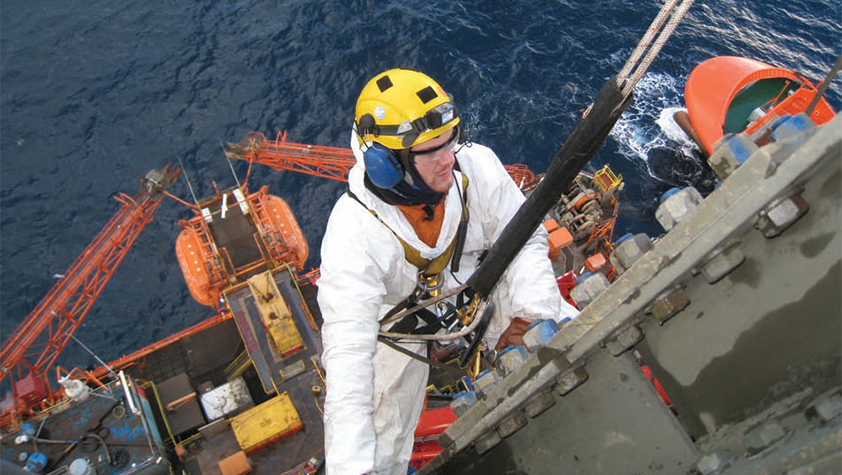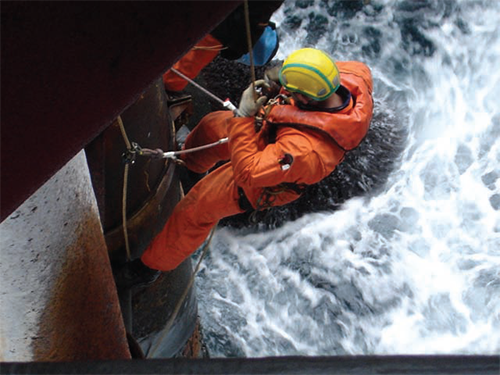
IRATA Leads Global Rope Access with Industry Standards
Knowing the ropes
Formed in the late 1980s in the UK, the Industrial Rope Access Trade Association or IRATA is the world’s leading authority on all aspects of the rope access industry.
It has over 250 member companies around the world, and has trained in excess of 60,000 rope access technicians. Through IRATA, industrial rope access has been developed to a point where it is the chosen means of access for much of the work in the offshore oil and gas industry, as well as a range of projects in construction, civil engineering, and built and natural environments.
Recently IRATA has gone through a significant change as highlighted by Keith Aldis, Group general manager and company secretary: “Since its beginnings 25 years ago it’s been by and large manned and supported on a volunteer basis, and administered ably by John Fairley of Association Group Management Limited (AGM). A decision was taken, now that IRATA has grown so big, to float away from its service supplier and to stand on its own two feet. As such, at the beginning of May 2013 it was agreed to move the organisation into its own home with its own staff in Ashford in Kent.”
Keith is also acting CEO of IRATA at this time, a role to which he comes with a strong track record: “My background is as a professional CEO and one who has worked in many differing industries, as well as an engineer by trade. I have been CEO of a number of trade associations, including some operating globally, and so it was natural for me to take onboard the challenge of moving IRATA forward into a new commercially driven, but socially responsible, member focused body.
“Aside from moving the organisation, one of the first things I’ve done is to introduce a properly constructed business planning approach to the business, and make sure that myself, the staff and volunteers are accountable to and measured for their performance by the membership. Operationally the real significant change will be where we properly incorporate our various RACs around the world and get them as semi-independent bodies to lobby and generate interest and engagement amongst their local markets,” he continues.
IRATA’s membership is primarily made up of operators who carry out the rope access works, and training companies which provide support to these parties in the form of training, assessment, audit, and certification services. The day-to-day management of this then rests with IRATA. Although operator member levels remain stable, there are changes taking place in the make-up of the wider membership base: “We have seen a significant increase in technician registration and certification globally with no signs of this abating,” notes Keith.
 “We are also seeing a greater uptake in organisations like manufacturers, clients and similar as associate members in supporting what we do, and this is a direct result of a lot of lobbying with governments and clients to ensure they understand the safety record IRATA systems have, together with the cost savings to be had. It is no accident that clients are specifying that contractors use the IRATA system over any other.”
“We are also seeing a greater uptake in organisations like manufacturers, clients and similar as associate members in supporting what we do, and this is a direct result of a lot of lobbying with governments and clients to ensure they understand the safety record IRATA systems have, together with the cost savings to be had. It is no accident that clients are specifying that contractors use the IRATA system over any other.”
Working at heights or at locations with difficult and or confined access is hugely challenging and as such requires great skill. From its very beginnings IRATA has been concerned with providing a safe working environment for the industry as demonstrated by its unrivalled safety record. Integral to maintaining this is its extensive focus on education, with all members required to complete its formal training and certification programme.
“Rope access is unique not only in its health and safety record but also where it is proven to be more convenient and cost effective to use such methods in place of erecting scaffolding or using moving and handling equipment,” emphasises Keith. “Certainly this is true in cases where the work requires good technicians to carry out structural inspection, painting, sand blasting, cleaning or other small works type activities. It is unlikely to replace wholly the use of scaffolding for example, where heavy lifting is required, but there are claims in many cases of up to 70 per cent cost savings when using rope access as opposed to carrying out similar work with those traditional set-ups.”
As well as the changes that are taking place to make IRATA more of a stand-alone force, this year will see the organisation introduce the latest generation of working practices. “We have a new International Code of Practice (ICOP) coming out and a new Technician Training Scheme launching as well. Both have been updated to include current practice and are future proofed as much as possible. These will drive our industry into a much safer position,” notes Keith.
A leader in its field it may be, but when it comes to the long-term future Keith is positive that IRATA will be scaling even greater heights: “It’s nothing but growth in my view,” he confirms. “As rope access operations become more valued, not least of all because of the cost savings over other systems, they will become much more used. In order to cope with this we have to make sure that our current membership is engaged and able to support their local markets. It has just been specified by the Nigerian government from their Department of Petroleum Resources that rope access operations must comply with IRATA standards and processes, as well as in Bahrain, which sees them join others all across the world, so we have to make sure we can deliver.”
IRATA
Services: Global trade organisation